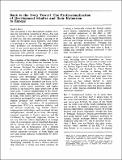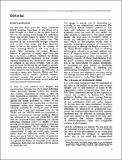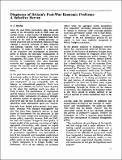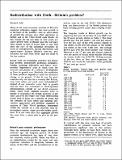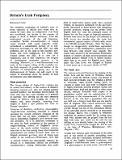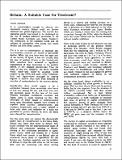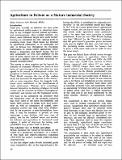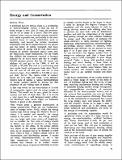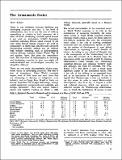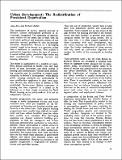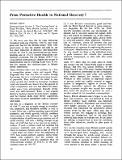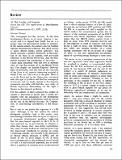Volume 9, Issue 2: Britain: A Case for Development?
Browse by
Recent Submissions
-
Back to the Ivory Tower? The Professionalisation of Development Studies and their Extension to Europe
(Institute of Development Studies, 01/12/1977)SUMMARY Anyone familiar with Latin America who goes to Portugal immediately feels in recognisable territory. It seems worth exploring the applicability of development theory to such countries of the European periphery and ... -
Editorial
(Institute of Development Studies, 01/12/1977) -
Diagnoses of Britain's Post?War Economic Problems: A Selective Survey
(Institute of Development Studies, 01/12/1977)SUMMARY Besides sharing the peculiarly Anglo?Saxon obsession with aggregate demand management, the British have been conspicuously narrow in their choice of policy instruments. The favourite was frequent tax changes, with ... -
Redistribution with Sloth—Britain's problem?
(Institute of Development Studies, 01/12/1977)SUMMARY Many if not most analyses of Britain's economic difficulties suggest that slow growth is at the heart of the problem—and an acceleration of growth the obvious cure. Past experience in Britain and in the Third World ... -
Britain's Irish Periphery
(Institute of Development Studies, 01/12/1977)SUMMARY The core?periphery frame of analysis gives useful insights into Anglo?Irish relations during the four centuries of the rise and decline of the British empire. The emigration from the Irish periphery of almost half ... -
Britain: A Suitable Case for Treatment?
(Institute of Development Studies, 01/12/1977)SUMMARY The development of the British economy has been profoundly imbalanced, with major inequality between big and small business, and multinational and national capital. These enterprises have now established what ... -
Agriculture in Britain as a Mature Industrial Society
(Institute of Development Studies, 01/12/1977)SUMMARY The post World War II phase of rapidly increasing British agricultural productivity, based upon the substitution of capital for labour, and upon cheap fossil fuels and heavy chemical dressing, is coming to an end. ... -
Energy and Conservation
(Institute of Development Studies, 01/12/1977)SUMMARY It is now recognised that the days of cheap energy are over. But most future forms of energy will be even more costly, because of greatly increased capital costs and steady exhaustion. This article argues that ... -
The Armaments Sector
(Institute of Development Studies, 01/12/1977)SUMMARY This article argues that the armament sector in Britain contrasts sharply with that in developing countries, where it is an important element in the pattern of dependence. In Britain, the armament sector is ... -
Urban Development: The Redistribution of Persistent Deprivation
(Institute of Development Studies, 01/12/1977)SUMMARY It may be worth examining the developing countries' experience of urban development for lessons to apply to Britain. A major difference is that in Britain housing and related services are treated as fully established ... -
From Protective Health to National Recovery ?
(Institute of Development Studies, 01/12/1977)SUMMARY Less?developed countries are ahead of developed countries in several areas of policy analysis. One is health. Analysts, and increasingly practitioners, are accepting that returns to spending on preventive ... -
Oil and Scotland: A Review of
(Institute of Development Studies, 01/12/1977)

